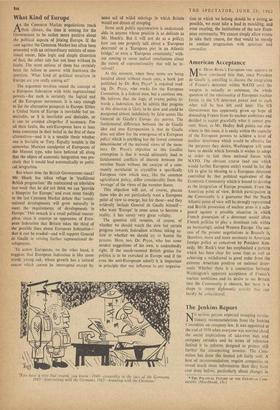What Kind of Europe
AAs the Common Market negotiations reach „t_theitr climax, the time is coming for the Government to be rather more positive about the political aspects of Joining Europe. If the case against the Common Market has often been presented with an extraordinary mixture of emo- tional smear, false logic and simple distortion of fact, the other side has not been without its faults. The most serious of them has certainly been the failure to answer with frankness the question, 'What kind of political structure in Europe are you really aiming at?'
The argument revolves round the concept of a European federation with wide supranational powers—for such is certainly the logical end of the European movement. It is easy enough to list the alternative prospects in Europe. Either a United States of Europe is inevitable but un- desirable, or it is inevitable and desirable, or it can be avoided altogether if necessary. For all their faults, the anti-Europeans have at least been consistent in their belief in the first of these alternatives—and it is a tenable thesis whether one is Socialist or Tory. Equally tenable is the somewhat Marxian standpoint of Europeans of the Monnet type, who have believed all along that the object of economic integration was pre- cisely that it would lead automatically to politi- cal integration, But where does the British Government stand? Mr. Heath has taken refuge in 'traditional British pragmatism.' He maintained on television last week that he did not think we can 'provide a blueprint for Europe,' and even more timidly in the last Common Market debate that 'consti- tutional developments will grow naturally to meet the requirements of developments in Europe.' This remark is a small political master- piece, since it conveys to opponents of Euro- pean federation that Britain takes the third of the possible lines about European federation— that it can be evaded—and will support General de Gaulle in vetoing further supranational de- velopments.
To ardent Europeans, on the other hand, it suggests that European federation is like some sturdy young oak, whose growth has a natural course which cannot be interrupted except by some ad of wilful sabotage to which Britain would not dream of stooping.
Some such public equivocation is understand- able in anyone whose position is as delicate as Mr. Heath's. But it will not do as a policy; how can one properly talk about a 'European deterrent' or a 'European pier in an Atlantic bridge,' or even a 'European community,' with- out coming to some radical conclusions about the extent of supranationality that will be in- volved?
At this moment, when these terms are being bandied about without much care, a book just published by Dr. Roy Pryce* is required read- ing. Dr. Pryce, who works for the European Committee, is a federal man, but a cautious one. He believes that the logic of events points to- wards a federation, but he admits that progress in this direction is likely to be slow and could be postponed almost indefinitely by false scents like General de Gaulle's Europe des patries. The fundamental differehce between the de Gaulle idea and true Europeanism is that de Gaulle does not allow for the emergence of a European policy which is anything but the lowest common denominator of the national views of the mem- bers. Dr. Pryce's objection to this Gaullist conception is that it would ultimately lead to fundamental conflicts of interest between the member States without the catalyst of a com- munity secretariat to crystallise a specifically European view which may, like the common agricultural policy, differ considerably from the 'average' of the views of the member States. This objection will not, of course, placate those who do not particularly want a European point of view to emerge, but for those—and they evidently include General de Gaulle himself— who want 'Europe' in some sense to become a reality, it has surely very great validity. The question still remains, of course, of whether we should watch the slow but certain progress towards federalism without taking ac- tion or whether we should try to hasten the process. Here, too, Dr. Pryce, who has some modest suggestions of his own, is undoubtedly right. If the much-vaunted British genius for politics is to be exercised in Europe and if (as even the anti-Europeans admit) it is important in principle that our influence in any organisa-
'You have a very bad record, you know : 1940— cowardice in the face of the Germans, 1945—fraternising with the Germans, 19G2-- -brawling with the Germans.'
Lion to which we belong should be a strong as possible, we must take a lead in moulding, and even creating, the institutions of the new Euro- pean community. We cannot simply allow events to take their course, for that would be merely to confuse pragmatism with quietism and cowardice.
































 Previous page
Previous page